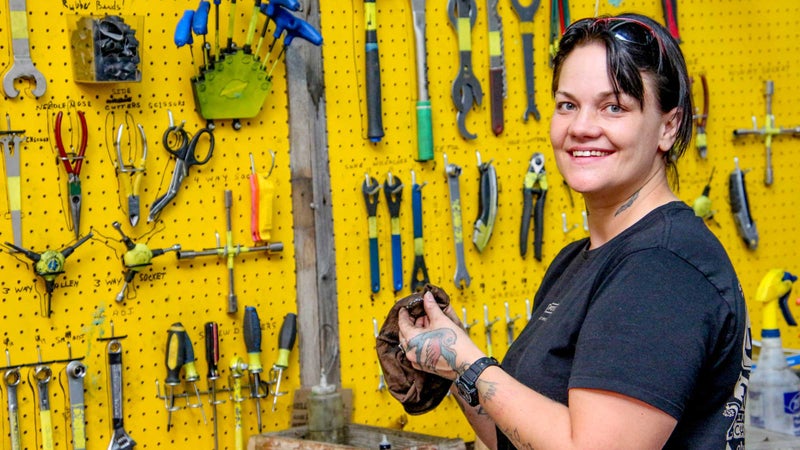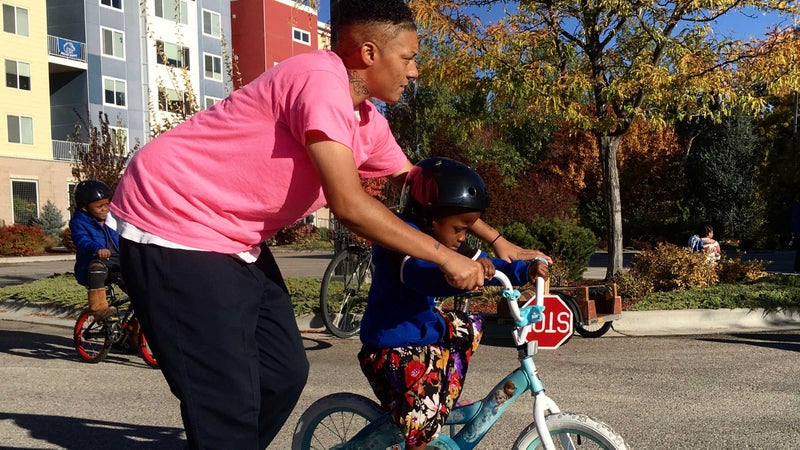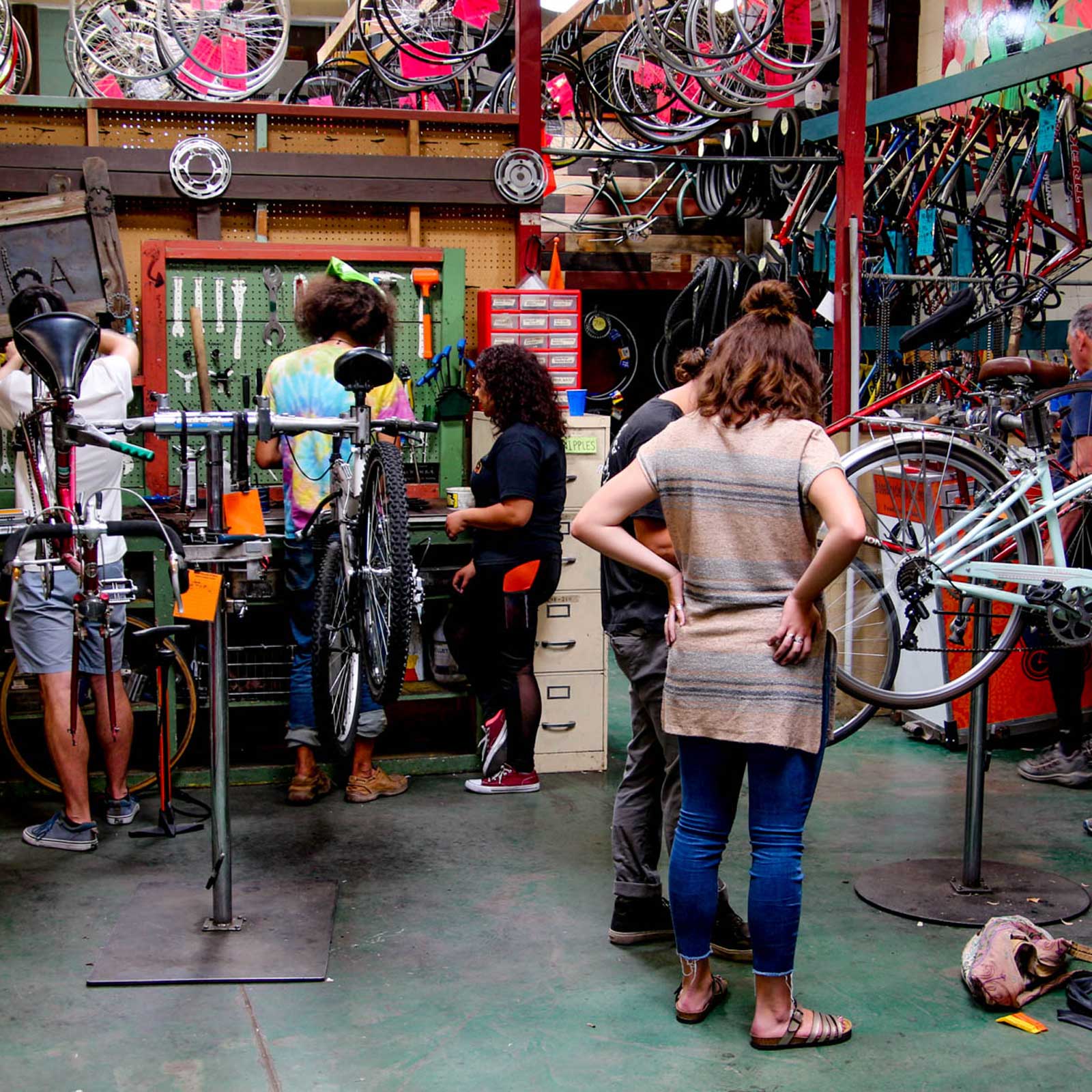It’s a late May afternoon at the South Boise Women’s Correctional Center (), a minimum-security center on an empty stretch of road in the sage-covered hills outside the Idaho city. Jessica Halbesleben, a 45-year-old inmate, meets with her three apprentices, Destiny, Robin, and Jamie (who asked to have their last names withheld), in the unit where she’s been living for the past three years. Under Halbesleben’s guidance, the trio—ranging in age from 24 to 36—check out bike tools in the prison’s lobby, then walk across the parking lot to a shed built specifically to give them a space to repair children’s bikes.
The women are part of a 200-person program called Shifting Gears that has inmates repairing bikes for donation. In exchange for their work, they get their own bike, helmet, lock, and light, which they can pick up upon release. Halbesleben has built 66 bikes since she joined Shifting Gears in the summer of 2016, just a few months after it was launched by the (BBP), a nonprofit whose goal is to get everyone in the city—no matter their income—on two wheels.
“It’s the putting it back together that I fell in love with,” Halbesleben says. “For me, it was a Zen experience. You get this bike that’s all dirty and rusty and has flat tires. You take something that’s broken and turn it into something that looks brand new.”

On this spring day, the women work in silence, stripping down the donated bikes, cleaning each part, adjusting components, then reassembling everything in a process that takes about 2.5 hours. Later that week, the refurbished bikes will be picked up by BBP employees to be distributed to Boise children in need, the majority of them refugees from Syria. (Due in part to the city’s low cost of living, friendly climate, and welcoming community, Boise has one of the largest per capita refugee populations in the country. According to the , more Syrian refugees live in the Idaho city than in New York City and Los Angeles combined.)
“The impact we make is very tangible,” says Jimmy Hallyburton, co-founder and executive director of the 16-person BBP. “A broken bike comes in by donation, a volunteer fixes it, and it goes into the hands of a smiling kid.”
Hallyburton grew up in Boise on a dairy farm and fought fires with the Idaho City Hotshot Crew before he co-founded the Boise Bicycle Project in 2007 in a former homeless shelter. At BBP’s DIY bike shop in downtown Boise, it’s common to find a cyclist wrenching on a $10,000 triathlon bike next to a Syrian refugee looking for a new commuter to ride while finding work. Since its inception, BBP has fixed and distributed more than 12,000 bikes and donated more than 5,000 to kids. Last year, the organization created a bicycle transportation program for adult refugees that taught more than 2,000 people about bike repair and safety.
For the some 600,000 inmates released from federal and state prisons annually, obtaining a state-issued driver’s license can be one of the biggest roadblocks to transitioning back into society.
The goal is to reduce transportation barriers—and few face as many of those as people just released from prison. According to the , for the some 600,000 inmates released from federal and state prisons annually, obtaining a state-issued driver’s license can be one of the biggest roadblocks to transitioning back into society.
So Hallyburton came up with the idea for Shifting Gears and pitched it to the director of the Idaho Department of Correction, who loved it. Different locations vied for the program, but the SBWCC eventually won the bid. The facility’s warden offered the project to Corporal Laura Carlson, who volunteered to run it. Carlson worked with BBP and scheduled training days with Lucky Kelley, a volunteer mechanic in his sixties who still comes to the facility every Saturday to swap bikes and train participants. Five inmates—including Halbesleben—were selected to start the program. Participants shadow a mentor for three days before they become trainers. “Most come into it thinking it’s something to do with their time, and they don’t anticipate how much it will change their lives,” Carlson says.
Take Destiny, for instance, who wrote about Shifting Gears in her exit survey: “I stopped looking forward to positive things in life the day I lost my little girl. It took me a whole year to come back to reality. Joining Shifting Gears is the best decision I’ve made since then. Helping a little girl ride the bike that I fixed made me look for a brighter tomorrow. The program opened my eyes and helped me realize what I want to do with my life: get out and work or volunteer with kids who are sick, in need, in the system, or even just lonely.”

Several inmates released from SBWCC have come downtown to BPB to work on their children’s bikes. “When the participants are released, we hope that some of them use the BPB as a support system,” Hallyburton says. “We hope they realize this is a safe space and a place to be surrounded by positive people.”
When Halbesleben is paroled from prison, most likely in January, she’ll have not only a bike that matches her height waiting for her at BBP, but also an opportunity to apply for a position at the organization. She dreams of starting her own nonprofit that provides school clothes and supplies to underserved teens. “Before I came to prison, I was locked in my own world,” Halbesleben says. “Having a chance to see what other people in my community and around the world are going through has been eye-opening. For me, it’s just been a huge appreciation for humanity as a whole. I can’t wait to get out there and be a part of it.”


